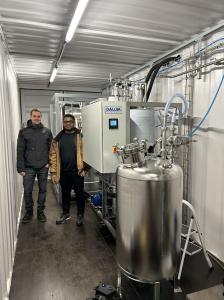Brewery-Inspired Scalable CO2 Liquefaction Solves Missing Link for Carbon Capture Startups
From Craft Beer to Climate Solutions: Kim Dalum's Scalable Brewery-Inspired CO2 Liquefaction Solves Missing Link for Carbon Capture Startups.
Founded by veteran engineer Kim Dalum, a recognized expert in CO2 processing, DALUM Beverage Equipment developed a patented solution allowing craft breweries and distilleries to recover, purify, and liquefy CO2 produced during fermentation for reuse or sale. This process is a significant "low-hanging fruit" for carbon avoidance, given that fermentation CO2 boasts over 97% purity, a stark contrast to the mere ~12% purity typically found in industrial flue gases.
The potential impact within the beverage sector alone is substantial. With 22 million barrels of craft beer produced globally each year, there's a potential to recover 80,000 metric tons of CO2 annually, at an estimated cost of just €70 per ton. A prime example of this success is Stewart Brewing in Scotland, which not only reuses its recovered CO2 but also sells the excess, turning a waste product into a valuable revenue stream.
Beyond breweries, distilleries represent another largely untapped source of biogenic CO2. While distilleries don't typically use CO2 in their processes, captured CO2 could be sold, sequestered in building materials, or even used for dry ice – all applications that directly displace CO2 sourced from industrial, fossil fuel-intensive processes.
However, DALUM's journey has taken an unexpected turn, revealing a critical need in the wider carbon capture landscape. Over the past two years, numerous carbon capture and DAC startups have approached DALUM, seeking solutions for the final, crucial stage of their process: CO2 liquefaction. Many of these nascent companies, while excelling in front-end capture and enrichment technologies, struggle with finding cost-effective, turn-key solutions for liquefying CO2, especially pilot programs and smaller-scale commercial plants. Kim Dalum elaborates, “It’s been a rewarding experience working with some of the brightest pioneers and innovators in the carbon capture industry to help them solve this ongoing challenge of processing and liquefying CO2 – no single project is the same and very much experimental in nature.”
This is where DALUM's specialized expertise shines. Kim Dalum's background as the former CEO of Union Engineering (now owned by Pentair), a leading manufacturer of industrial CO2 recovery plants, provides an unparalleled foundation in gas processing. DALUM has leveraged this experience to design custom liquefaction solutions capable of purifying CO2 with purity as low as 70% coming from flue gas at a project with the environmental technology company ESTECH in Denmark at the municipality of Odense. Another project Kim Dalum personally was involved in, is in Germany, an innovative DAC project led by DACMA and Karlsruhe Institute of Technology (KIT).
Crucially, DALUM's plants are designed for accessibility. Starting at €44,000, for their smallest size, a 5kg/hr unit, they arrive fully assembled and are remarkably compact – about the size of a phone booth. This makes them an attractive proposition for startups that need efficient, scalable, and readily deployable liquefaction capabilities without significant upfront infrastructure investment.
To date, DALUM has sold ten plants to carbon capture and DAC customers ranging in capacities from 5kg per hour of CO2 to 30kg+ per hour, demonstrating the versatility of their technology, with some units customized for lower purity CO2 streams and others being standard models. By providing this essential "last mile" solution, DALUM enables carbon capture and DAC startups to focus on their core capture technologies, accelerating the deployment of crucial climate solutions.
DALUM Beverage Equipment's evolution from a niche beverage industry supplier to a pivotal player in the broader carbon capture ecosystem highlights the interconnectedness of sustainable practices across industries. Their innovative approach to CO2 liquefaction is not just optimizing brewing; it's helping to unlock the potential of a truly circular carbon economy.
About Dalum Equipment
DALUM Equipment based in Denmark and Wisconsin, USA was founded by Kim Dalum, PhD. Dalum’s mission is to make a significant contribution to the reduction of global CO2 emissions in the craft brewing market and beyond.
Kelly Fetherolf
Dalum Beverage Equipment
+1 818-391-7544
email us here
Visit us on social media:
LinkedIn
Instagram
Facebook
YouTube
Legal Disclaimer:
EIN Presswire provides this news content "as is" without warranty of any kind. We do not accept any responsibility or liability for the accuracy, content, images, videos, licenses, completeness, legality, or reliability of the information contained in this article. If you have any complaints or copyright issues related to this article, kindly contact the author above.
Black Circle Society Introduces Travel-Focused Lifestyle Membership Aimed at Frequent Flyers and Business Professionals
Future of Renewable Energy Integration Systems Market Growth, Leaders & Trends 2024–2031
Sinai Memorial Chapels Serves Delray Beach with Trusted, Tradition-Based Jewish Funeral Services
Więcej ważnych informacji
 Jedynka Newserii
Jedynka Newserii

 Jedynka Newserii
Jedynka Newserii

Polityka

D. Joński: Nie wiemy, co zrobi Rosja za dwa–trzy lata. Według duńskiego wywiadu może zaatakować kraje nadbałtyckie i musimy być na to gotowi
Zdecydowana większość krajów unijnych wskazuje na potrzebę wzmocnienia zdolności obronnych Europy w obliczu coraz bardziej złożonego geopolitycznego tła. Wywiady zachodnich państw wskazują, że Rosja może rozpocząć konfrontację z NATO jeszcze przed 2030 rokiem. Biała księga w sprawie obronności europejskiej „Gotowość 2030” zakłada m.in. ochronę granic lądowych, powietrznych i morskich UE, a sztandarowym projektem ma być Tarcza Wschód. – W budzeniu Europy duże zasługi ma polska prezydencja – ocenia europoseł Dariusz Joński.
Transport
Duże magazyny energii przyspieszą rozwój transportu niskoemisyjnego w Europie. Przyszłością może być wodór służący jako paliwo i nośnik energii

Zmiany w europejskim transporcie przyspieszają. Trendem jest elektromobilność, zwłaszcza w ramach logistyki „ostatniej mili”. Jednocześnie jednak udział samochodów w pełni elektrycznych w polskich firmach spadł z 18 do 12 proc., co wpisuje się w szerszy europejski trend spowolnienia elektromobilności. Główne bariery to ograniczona liczba publicznych stacji ładowania, wysoka cena pojazdów i brak dostępu do odpowiedniej infrastruktury. – Potrzebne są odpowiednio duże magazyny taniej energii. Przyszłością przede wszystkim jest wodór – ocenia Andrzej Gemra z Renault Group.
Infrastruktura
W Polsce w obiektach zabytkowych wciąż brakuje nowoczesnych rozwiązań przeciwpożarowych. Potrzebna jest większa elastyczność w stosowaniu przepisów

Pogodzenie interesów konserwatorów, projektantów, inwestorów, rzeczoznawców i służby ochrony pożarowej stanowi jedno z największych wyzwań w zakresie ochrony przeciwpożarowej obiektów konserwatorskich. Pożary zabytków takich jak m.in. katedra Notre-Dame w Paryżu przyczyniają się do wprowadzania nowatorskich rozwiązań technicznych w zakresie ochrony przeciwpożarowej. W Polsce obowiązuje już konieczność instalacji systemów detekcji. Inwestorzy często jednak rezygnują z realizacji projektów dotyczących obiektów zabytkowych z uwagi na zmieniające się i coraz bardziej restrykcyjne przepisy czy też względy ekonomiczne.
Partner serwisu
Szkolenia

Akademia Newserii
Akademia Newserii to projekt, w ramach którego najlepsi polscy dziennikarze biznesowi, giełdowi oraz lifestylowi, a także szkoleniowcy z wieloletnim doświadczeniem dzielą się swoją wiedzą nt. pracy z mediami.




![Nestlé w Polsce podsumowuje wpływ na krajową gospodarkę. Firma wygenerowała 0,6 proc. polskiego PKB [DEPESZA]](https://www.newseria.pl/files/1097841585/fabryka-nesquik_1,w_85,r_png,_small.png)




.gif)

 |
| |
| |
|